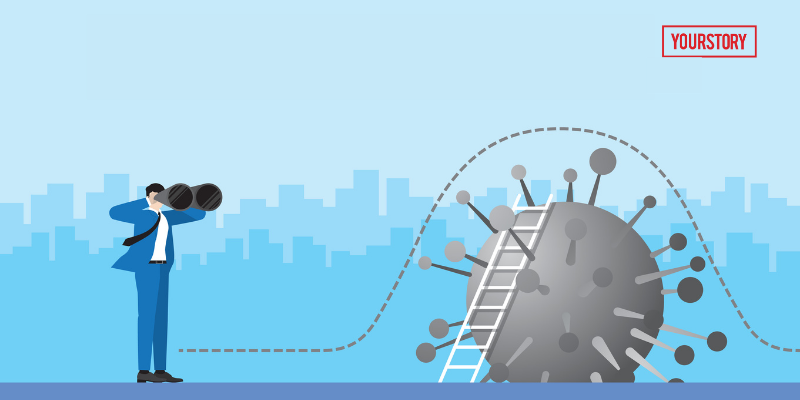The coronavirus crisis: a catalyst for entrepreneurship
The coronavirus pandemic has been a black swan event in the history of the modern world, which forced individuals, startups, and societies to adjust to a new normal globally.
The advent of coronavirus has been a black swan event in the history of the modern world, which forced individuals, startups, and societies to adjust to a new normal globally. With phrases like lockdowns, social distancing, and vaccine hesitancy entering the lexicon and demand evaporating overnight in sectors of the economy we grappled to come to terms with working in the new VUCA world globally.
Closer home, the Indian economy, prior to the advent of this crisis, was undergoing the pains of structural adjustment of demonetisation and GST, and there was a general liquidity squeeze. However, now, in the latter half of 2021, an analysis of the data reveals that the Indian economy, while hurt, and smaller in size than it was pre-pandemic, has survived rather well.
Of course, there are myriad factors one may point towards to explain this — strong fundamentals, large domestic market, governmental policy, to name a few.
However, I’d like to argue that another key factor in this relative success has been the ability of the startup sector to not only survive but thrive. They took the adversity they were faced with and looked at it as an opportunity, pivoted business models and where possible, added value through social initiatives.
While certain sectors were devastated with demand drying up overnight (hospitality, events, discretionary purchases in FMCG), others suddenly saw a huge upswing (fintech, edtech, deeptech) in demand and/or investments. Looking back at the past seventeen months one thing is clear the startup sector has given a good account of itself in this crisis.
Edtech
Edtech is the sector where this change is most obvious. Ever since lockdowns became a fact of life, virtual education has been the mantra of the day.
The K-12 market for edtech is projected to grow 6.3 times in the next financial year, and the post-K-12 market 3.7 times. During the lockdown period, , , , and all have reported a significant increment in traffic share.
BYJU’S added over seven million new users during the lockdown; Toppr also recorded 2X growth in the paid user base. From a current estimated market size of less than $2 billion, the industry is poised to grow to $10 billion by 2025.
Healthtech
Healthtech, which constitutes technological advancements such as medical wearables, telemedicine/telehealth, e-pharmacy, artificial intelligence, electronic health records/medical records, and medical applications related to personal health are all poised to grow exponentially in the post-COVID-19 era.
The pandemic has been a wake-up call for the rise of healthtech-enabled Indian healthcare ecosystem to broad base enablement of healthcare services to its people.
The coronavirus crisis has placed this sector at a strategic inflexion point of disruption. It has evolved from being a niche undertaking focused primarily on personal health and wellbeing, to being seen as a tool for strengthening the medical infrastructure and providing more effective emergency care.
Fintech
Within this segment, most investments and growth were skewed towards startups operating in insurance, agriculture, and online payments.
Credit/lending fintech’s faced a negative impact due to the moratorium imposed by RBI but the flip side was that the crises accelerated the digital initiatives in these firms to engage with the end customers, new partnerships for collections and innovation in new forms of underwriting.
These will stand them in good stead as we transition to the new normal
Logitech
The unprecedented migration of manpower during the first wave shook the very core of supply chains in the country. With the second wave striking earlier this year, further flaws were revealed in logistics and supply chain management.
Myriad factors amplified these costs; rise in fuel and commodity prices, negligible storage and transportation capacity, high cost of labour from manufacturers, and higher charges in transfer and management of products.
Partnerships created among logistics competitors were a new development including the integration of different supply chain services and partners. The performance of Delhivery which expects to do an IPO next year outshone more illustrious peers in this sector.
Consumer Tech
While demand for discretionary goods vanished the essentials category continued to soar with wellness products coming to the fore. A surprise was observed in the Cosmetics world, companies like Lakme and Maybelline were long time juggernauts. They had captured the eye of the Indian demographic and did not seem likely to be beat.
However, during the pandemic, companies like and disrupted these traditional giants, and established themselves as serious competitors. , using a strategy of well-placed online advertisement and targeted messaging, managed to capture the hearts of Indian millennials.
They reached nearly $330 million in revenue during FY 2020-21. The most astonishing part though is that this number grew by 35 percent compared to the previous year even amidst the adversity of pandemic necessitated lockdowns.
This is, in large part due to their keen adoption and promotion of an online business model, through targeted advertisements, and a robust mobile app.
SMEs + Entrepreneurs
While these sectors and startups have shown tremendous innovation and resilience in the face of this crisis, they have not been the only ones to adapt to the new normal. SMEs and individual entrepreneurs have sensed short term opportunities in the production of goods like sanitisers, masks, and in the provision of services like sanitisation of premises, medical testing etc.
These fields saw a string of entrepreneurial urges finding manifestation in the past year. However, as the crisis abates, these businesses will have to find alternative models or shut down. Their success, while impressive, was predicated largely on the massive supply gap.
As the demand stabilises, competition will increase, and these smaller ventures may not remain as competitive as they previously were.
All is not Kosher
I would be remiss if I did not point out the obvious reality that there are many sectors for whom this crisis has been nothing short of devastating. Hospitality, travel and tourism, restaurants, entertainment like shopping malls and cinemas, discretionary consumption in white goods, and FMCG are just a few examples of industry have been forced to show resilience and adapt to meet the needs of the times or perish.
For example, many hotels started converting their premises to Covid facilities, or Covid recovery settings. Restaurants were forced to shift to online home delivery models. Such changes are both laudable and profitable, as they not only benefited the companies and helped them survive the crisis, but they also provided crucial services during a time of societal need.
Summary
In the long term, however, the government will need to kickstart the severely impacted sectors, to spur a recovery into the mainstream of the Indian economy. A possible way to achieve may be via direct cash transfers to micro-SME and informal sector entrepreneurs.
Overall, though, one can very clearly see how the Covid-19 crisis has spurred innovation and entrepreneurship in our economy. The question going forward will be twofold; what the companies and entrepreneurs that reached the top of their respective markets during this period do with their newfound success, and how will those unable to adapt to the new normal recover?
Edited by Saheli Sen Gupta
(Disclaimer: The views and opinions expressed in this article are those of the author and do not necessarily reflect the views of YourStory.)










![[Funding alert] Space tech startup Pixxel raises $5M seed funding from Blume, growX, and Lightspeed](https://images.yourstory.com/cs/2/a9efa9c02dd911e9adc52d913c55075e/Imagekh9x-1597755580189.jpg)